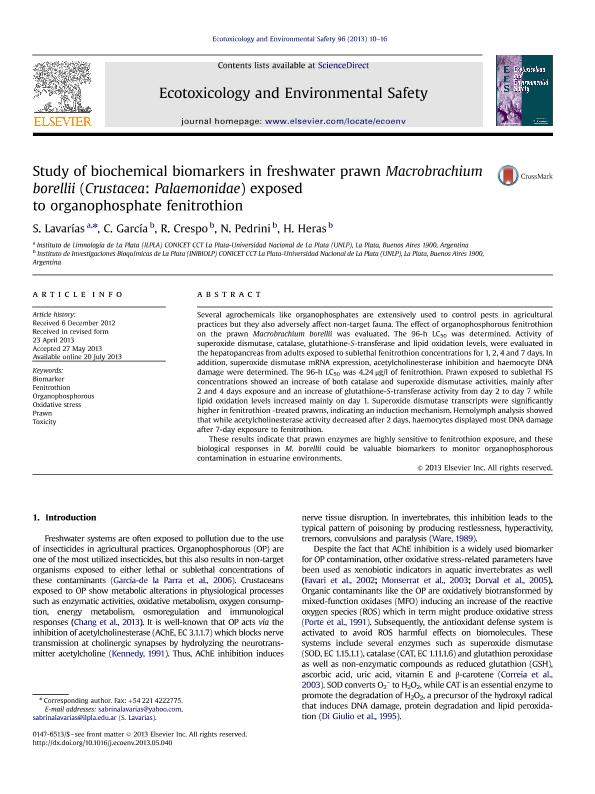Artículo
Study of biochemical biomarkers in freshwater prawn Macrobrachium borellii (Crustacea: Palaemonidae) exposed to organophosphate fenitrothion
Lavarias, Sabrina Maria Luisa ; Garcia, Carlos Fernando
; Garcia, Carlos Fernando ; Crespo, Rosana
; Crespo, Rosana ; Pedrini, Nicolás
; Pedrini, Nicolás ; Heras, Horacio
; Heras, Horacio
 ; Garcia, Carlos Fernando
; Garcia, Carlos Fernando ; Crespo, Rosana
; Crespo, Rosana ; Pedrini, Nicolás
; Pedrini, Nicolás ; Heras, Horacio
; Heras, Horacio
Fecha de publicación:
20/07/2013
Editorial:
Academic Press Inc Elsevier Science
Revista:
Ecotoxicology and Environmental Safety
ISSN:
0147-6513
Idioma:
Inglés
Tipo de recurso:
Artículo publicado
Clasificación temática:
Resumen
Several agrochemicals like organophosphates are extensively used to control pests in agricultural practices but they also adversely affect non-target fauna. The effect of organophosphorous fenitrothion on the prawn Macrobrachium borellii was evaluated. The 96-h LC50 was determined. Activity of superoxide dismutase, catalase, glutathione-S-transferase and lipid oxidation levels, were evaluated in the hepatopancreas from adults exposed to sublethal fenitrothion concentrations for 1, 2, 4 and 7 days. In addition, superoxide dismutase mRNA expression, acetylcholinesterase inhibition and haemocyte DNA damage were determined. The 96-h LC50 was 4.24 μg/l of fenitrothion. Prawn exposed to sublethal FS concentrations showed an increase of both catalase and superoxide dismutase activities, mainly after 2 and 4 days exposure and an increase of glutathione-S-transferase activity from day 2 to day 7 while lipid oxidation levels increased mainly on day 1. Superoxide dismutase transcripts were significantly higher in fenitrothion -treated prawns, indicating an induction mechanism. Hemolymph analysis showed that while acetylcholinesterase activity decreased after 2 days, haemocytes displayed most DNA damage after 7-day exposure to fenitrothion. These results indicate that prawn enzymes are highly sensitive to fenitrothion exposure, and these biological responses in M. borellii could be valuable biomarkers to monitor organophosphorous contamination in estuarine environments.
Palabras clave:
Biomarker
,
Fenitrothion
,
Organophosphorous
,
Oxidative Stress
,
Prawn Toxicity
Archivos asociados
Licencia
Identificadores
Colecciones
Articulos(INIBIOLP)
Articulos de INST.DE INVEST.BIOQUIMICAS DE LA PLATA
Articulos de INST.DE INVEST.BIOQUIMICAS DE LA PLATA
Citación
Lavarias, Sabrina Maria Luisa; Garcia, Carlos Fernando; Crespo, Rosana; Pedrini, Nicolás; Heras, Horacio; Study of biochemical biomarkers in freshwater prawn Macrobrachium borellii (Crustacea: Palaemonidae) exposed to organophosphate fenitrothion; Academic Press Inc Elsevier Science; Ecotoxicology and Environmental Safety; 96; 20-7-2013; 10-16
Compartir
Altmétricas



